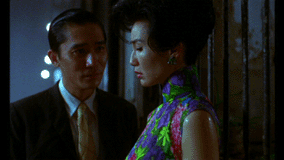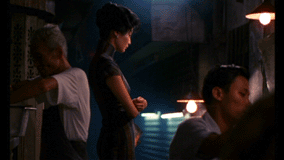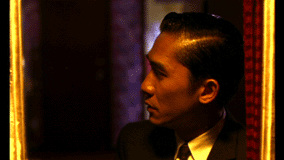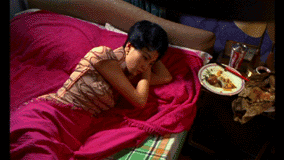In
the Mood for Love (Wong Kar-Wai) 2001
 Wong
Kar-Wai's (Chunking Express, Happy Together) In the Mood for Love,
is an opaque romance that stars Tony Leung & Maggie Cheung as neighbors in
Hong Kong during the early 1960's. The 96 min. film begins with a series of
vignettes that run about 1/2 hour. These scenes show how a man and woman who
live next door to each other meet, and slowly learn about each other's lives.
Each scene is short (most are less that 1 minute long), and each presents a
sliver of the characters' daily lives. We see each of them interacting only
superficially with their coworkers, their landlords, and each other. They pass
each other as they enter and exit their house and a restaurant. They return
borrowed items. They exchange pleasantries in the hallway. For the 1st 1/3 of
the film, they never stop to talk to each other for anything other than a
practical reason. We never are shown either spouse, as they are both away on
frequent business trips, but that's usually the topic of discussion, since
that's almost everything the two know about each other at that point.
Wong
Kar-Wai's (Chunking Express, Happy Together) In the Mood for Love,
is an opaque romance that stars Tony Leung & Maggie Cheung as neighbors in
Hong Kong during the early 1960's. The 96 min. film begins with a series of
vignettes that run about 1/2 hour. These scenes show how a man and woman who
live next door to each other meet, and slowly learn about each other's lives.
Each scene is short (most are less that 1 minute long), and each presents a
sliver of the characters' daily lives. We see each of them interacting only
superficially with their coworkers, their landlords, and each other. They pass
each other as they enter and exit their house and a restaurant. They return
borrowed items. They exchange pleasantries in the hallway. For the 1st 1/3 of
the film, they never stop to talk to each other for anything other than a
practical reason. We never are shown either spouse, as they are both away on
frequent business trips, but that's usually the topic of discussion, since
that's almost everything the two know about each other at that point.
 This is the most incredible sequence of the film, because the characters never
stop and talk to each other about anything related to the eventual plot which
grows organically from these incidents. The film is almost Hitchcockian in the
way it presents clues about their lives, and we put together the pieces about
what is going behind their backs at the same time as they do. Soon, both are
suspicious their spouses are sleeping together. They eventually confront the
issue, and through each others' suspicions confirm their fears. Until this
point, we are privy to the benefits of Wong's style (he shoots without a
definite script, and usually pieces together what his film is actually about in
the editing room.)
This is the most incredible sequence of the film, because the characters never
stop and talk to each other about anything related to the eventual plot which
grows organically from these incidents. The film is almost Hitchcockian in the
way it presents clues about their lives, and we put together the pieces about
what is going behind their backs at the same time as they do. Soon, both are
suspicious their spouses are sleeping together. They eventually confront the
issue, and through each others' suspicions confirm their fears. Until this
point, we are privy to the benefits of Wong's style (he shoots without a
definite script, and usually pieces together what his film is actually about in
the editing room.)
 The film is really amazing in that it allows these two characters to lead fully
believable lives, but creates a compelling plot from them. Before I compared it
to Hitchcock, but the movie it's most like is Chabrol's La Ceromonie,
another film that escalated everyday tensions until they became much more
realized and pointed feelings. After the first third of the film, they begin
talking on a normal basis. They openly discuss their situation, and begin to
retrace the steps of their respective spouses in an attempt to understand how
such a thing could happen. The movie becomes less cinematically dazzling, but
more emotionally compelling at this point. I don't want to give away the plot to
those who haven't seen it, but the love story contained within is executed
wonderfully. That this is accomplished without showing two major players in the
plot only further shows us how adept a director Wong is.
The film is really amazing in that it allows these two characters to lead fully
believable lives, but creates a compelling plot from them. Before I compared it
to Hitchcock, but the movie it's most like is Chabrol's La Ceromonie,
another film that escalated everyday tensions until they became much more
realized and pointed feelings. After the first third of the film, they begin
talking on a normal basis. They openly discuss their situation, and begin to
retrace the steps of their respective spouses in an attempt to understand how
such a thing could happen. The movie becomes less cinematically dazzling, but
more emotionally compelling at this point. I don't want to give away the plot to
those who haven't seen it, but the love story contained within is executed
wonderfully. That this is accomplished without showing two major players in the
plot only further shows us how adept a director Wong is.
 The film gives a small amount of comfort, and definitely does not qualify as a
typical romantic film. I found its restraint to be amazingly touching, though I
could easily imagine some would find it unbearable. In addition to the film's
emotional values, the film is top-notch aesthetically. It is drop-dead gorgeous.
I doubt I'll see a more elegant looking film this year. The score is heavenly
and goes a great deal toward establishing a hypnotic feel. The film's use of
costuming is particularly noteworthy, as the costume changes of Cheung's
character are often used to show us the passage of time (which the film's
episodically structure sometimes obscures.) Leung & Cheung both give
fantastic performances, though I am surprised Leung was able to scoop up a Best
Actor prize at Cannes for such an understated performance. Cheung gets the most
"big" scenes (in a film with relatively few). It's probably a film
that thrives too much on nuance to ever be fully appreciated, but it's nuance is
precisely what makes me recognize it as a great work.
The film gives a small amount of comfort, and definitely does not qualify as a
typical romantic film. I found its restraint to be amazingly touching, though I
could easily imagine some would find it unbearable. In addition to the film's
emotional values, the film is top-notch aesthetically. It is drop-dead gorgeous.
I doubt I'll see a more elegant looking film this year. The score is heavenly
and goes a great deal toward establishing a hypnotic feel. The film's use of
costuming is particularly noteworthy, as the costume changes of Cheung's
character are often used to show us the passage of time (which the film's
episodically structure sometimes obscures.) Leung & Cheung both give
fantastic performances, though I am surprised Leung was able to scoop up a Best
Actor prize at Cannes for such an understated performance. Cheung gets the most
"big" scenes (in a film with relatively few). It's probably a film
that thrives too much on nuance to ever be fully appreciated, but it's nuance is
precisely what makes me recognize it as a great work.
****
September, 2001
Jeremy Heilman